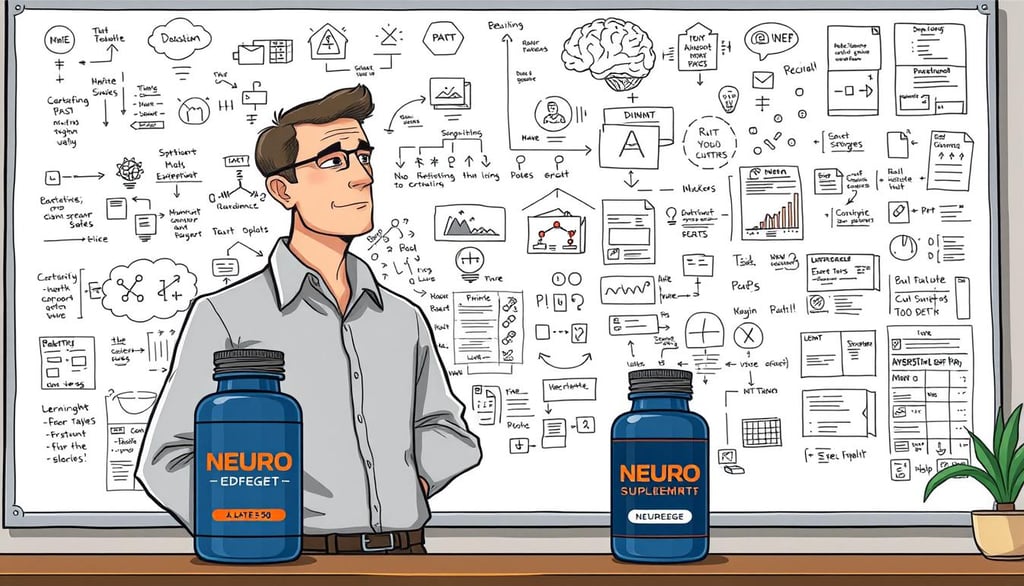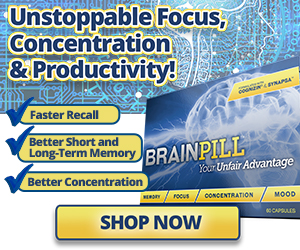Level up your thinking: Which nootropic supplements deliver?
Discover the power of nootropic supplements to boost focus, memory, and mental clarity.
STRESS MANAGEMENT
ActiveVitaLife
5/10/202513 min read
Can cognitive enhancers really boost your mental performance and unlock your full capacity? As more people look for ways to improve their brainpower, brain health supplements are getting a lot of attention.
Nootropic supplements aim to enhance cognitive function, focusing on memory, focus, and mental clarity. With the rising need for mental performance boosters, knowing what these supplements offer is key.
As we dive into the realm of nootropic supplements, it's vital to grasp their possible benefits and how they aid in brain health.
Key Takeaways
Understanding the role of nootropic supplements in cognitive enhancement.
Exploring the possible benefits of brain health supplements.
Identifying key cognitive enhancers and their effects.
Learning how to incorporate nootropic supplements into your daily routine.
Recognizing the importance of mental clarity and focus in daily life.
What Are Nootropic Supplements?
Nootropic supplements, also known as "smart drugs," aim to boost brain function. They help with memory, focus, and mental clarity. Many people use them to improve their mental performance and brain health.
Definition and Purpose
Nootropic supplements aim to improve cognitive function. This includes memory, creativity, and problem-solving. They help enhance mental performance, motivation, and brain health. The main goal is to support brain function, keeping you focused and productive.
These supplements come in different forms like capsules, tablets, powders, and liquids. They often mix natural ingredients like herbs, vitamins, and minerals. These ingredients are thought to improve cognitive abilities.
History of Nootropics
The idea of nootropics started in the 1970s. Romanian psychologist and chemist Corneliu E. Giurgea coined the term. He defined nootropics as substances that boost memory and cognitive function, and protect the brain.
Over time, research on nootropics has grown. Today, nootropic supplements are easy to find. Their popularity keeps rising as people look to support their brain health and cognitive abilities.
How Do Nootropic Supplements Work?
Nootropic supplements change brain chemistry to boost thinking skills. They aim to improve mental performance by focusing on different brain functions.
Mechanisms of Action
These supplements have several ways to work. They can enhance neurotransmitter activity, increase blood flow to the brain, and protect neurons. For example, some may raise dopamine and acetylcholine levels, key for memory and learning.
Others help manage stress, which can harm thinking skills. This leads to better focus, concentration, and clear thinking.
Brain Chemistry and Cognitive Enhancement
The way nootropics affect brain chemistry is key to their success. They can change neurotransmitter levels to improve memory, attention, and problem-solving.
For instance, cholinergic nootropics boost memory. Those affecting the dopaminergic system can increase motivation and pleasure.
Grasping how nootropics interact with brain chemistry is vital. By tailoring supplement regimens to personal needs, people can get the most out of these brain boosters.
Types of Nootropic Supplements
Nootropic supplements fall into two main types: natural and synthetic. Each has its own benefits. Knowing the difference is key for those looking to boost their brain power.
Natural Nootropics
Natural nootropics come from plants, herbs, and other natural sources. They've been used for centuries to help the brain. Examples include:
Ginkgo Biloba: It may improve memory and brain function.
Bacopa Monnieri: It's known to boost memory and thinking speed.
Omega-3 Fatty Acids: They're vital for brain health and thinking.
People often choose natural nootropics for their safety and fewer side effects.
Synthetic Nootropics
Synthetic nootropics are made in labs to enhance brain function. They come from a lot of research in neuroscience and pharmacology. Examples are:
Racetams: They can improve memory, focus, and brain function.
Noopept: It's thought to protect the brain and boost thinking.
Modafinil: It helps keep you alert and focused.
Synthetic nootropics are strong and targeted. But, they need more care because of possible side effects and interactions.
In summary, natural and synthetic nootropics have their own advantages and things to consider. It's important to think about what you need and prefer when picking between them.
Common Ingredients in Nootropic Supplements
Knowing what's in nootropic supplements is key to making smart choices. These supplements mix natural and synthetic stuff to boost brain power.
They work because of the variety of ingredients. You'll often find caffeine, L-theanine, Ginkgo biloba, and Bacopa monnieri. Each has its own way of helping your brain.
Caffeine
Caffeine is a stimulant that helps you stay alert and focused. It blocks adenosine receptors, making your brain work harder. This can make you more concentrated and energetic.
But, too much caffeine can make you jittery or anxious. Aim for 100mg to 200mg a day to avoid these issues.
L-Theanine
L-theanine is an amino acid from green tea. It helps you relax and lowers stress without making you sleepy. It pairs well with caffeine to sharpen your focus and brain power.
Research shows L-theanine boosts attention and counters stress. It's a common addition to nootropics for a balanced effect.
Ginkgo Biloba
Ginkgo biloba is an ancient tree used in medicine for ages. It's thought to boost memory and brain function by improving blood flow.
It's packed with antioxidants and protects the brain. Ginkgo biloba is in many nootropics to support brain health.
Bacopa Monnieri
Bacopa monnieri is an herb from Ayurvedic medicine. It's believed to grow nerve endings and improve how the brain processes information.
Studies back up its ability to enhance memory and recall. It's a key ingredient in many nootropics for brain health.
In summary, ingredients like caffeine, L-theanine, Ginkgo biloba, and Bacopa monnieri are in nootropics for good reasons. Knowing what's in them helps you pick the right supplement for your brain.
Benefits of Nootropic Supplements
Nootropic supplements help improve mental performance. They are popular for those wanting to boost their brain power. These supplements offer many cognitive benefits.
Enhanced Focus and Concentration
Nootropics improve focus and concentration. They help you stay focused and productive. Ingredients like caffeine and L-theanine boost alertness and cut down distractions.
Improved attention span
Better task management
Enhanced mental clarity
Improved Memory Retention
Nootropics also help with memory retention and recall. Ingredients like Bacopa Monnieri and Ginkgo Biloba improve neuron health and connections. This enhances memory.
Better retention of new information
Improved recall of learned information
Enhanced ability to learn new skills
Increased Creativity
Some nootropics boost creativity. They help the brain make new connections and think differently. This is great for creative fields or solving problems in new ways.
Enhanced imagination
Increased innovation
Better problem-solving skills
In summary, nootropic supplements offer many cognitive benefits. They support brain function and improve mental performance. By choosing the right supplement, you can reach your cognitive goals.
Potential Risks and Side Effects
It's important to know the risks and side effects of nootropic supplements for safe use. These supplements aim to boost brain function but can have negative effects too.
Common Side Effects
Nootropic supplements can cause side effects, like headaches, nausea, and dizziness. For example, caffeine in these supplements can make you jittery and anxious if taken too much.
L-Theanine, another common ingredient, is usually safe but can make you sleepy if you take too much. Knowing these side effects helps you adjust your dosage or stop using them if needed.
Long-Term Use Implications
The long-term effects of nootropic supplements are not fully known. They can vary based on the ingredients. Some nootropics may lead to dependence or reduced effectiveness over time.
Using certain stimulants for a long time can make your body need more to feel the same effect. This can lead to a cycle of needing more and more. It's wise to cycle nootropic supplements and talk to a healthcare professional to avoid these risks.
Also, the supplement industry's lack of strict rules means quality and safety can differ a lot between brands. So, picking well-known brands and being careful with long-term use is smart.
Popular Nootropic Supplement Brands
More and more people are looking for ways to boost their brain power. This has led to a surge in nootropic supplements. We'll look at some top brands, their ingredients, benefits, and what users say.
Alpha Brain by Onnit
Alpha Brain by Onnit is a favorite among many. It has Bacopa Monnieri, L-Tyrosine, and Phosphatidylserine to help with memory and focus. People say it makes them feel more calm and sharp.
Alpha Brain's mix of ingredients is key to its success. But, everyone's brain is different, so results can vary. Some find the effects subtle.
Mind Lab Pro
Mind Lab Pro is known for its all-around nootropic formula. It has L-Theanine, Rhodiola Rosea, and Bacopa Monnieri to boost memory and focus. Users like how it makes them feel more alert and less stressed.
Mind Lab Pro stands out for its clear ingredient list. This transparency has earned it a good name among users.
Qualia Mind
Qualia Mind by Neurohacker Collective is packed with ingredients for brain health. It includes citicoline, acetyl-L-carnitine, and rhodiola rosea to improve focus and energy. People say it really helps their brain function.
Qualia Mind is loved for its wide range of benefits. It's a top pick for those looking for a complete brain boost.
In summary, these nootropic brands offer various benefits. When picking a supplement, think about what you need, read what others say, and check the ingredients. This will help you make a smart choice.
The Science Behind Nootropics
Understanding nootropics is key to making smart choices about using them. These supplements aim to boost brain health and cognitive function. But, their effectiveness and safety are areas of ongoing research.
Many studies have looked into how nootropics affect memory, attention, and executive functions. These studies dive into the biochemical actions of nootropic ingredients.
Research Studies and Findings
Studies on nootropics have shown promising results. For example, cognitive enhancers like caffeine and L-theanine can improve alertness and focus. These effects are seen in both short-term and long-term studies.
A study in the Journal of Alzheimer's Disease found that Bacopa monnieri boosts memory in older adults. This makes it a strong brain function support supplement. On the other hand, Ginkgo biloba may help with memory and cognitive speed, but results vary.
Nootropics work in different ways, affecting neurotransmitters, neuronal health, and blood flow. Research studies are working to understand these mechanisms better. This knowledge helps us use nootropics effectively.
Expert Opinions
Experts in cognitive neuroscience and nutrition share their views on nootropics. Some support their use based on research, while others worry about lack of standardization and long-term safety.
Dr. David Perlmutter, a neurologist, stresses the importance of a holistic approach to brain health. He believes nootropics can be helpful but should be part of a healthy lifestyle and diet. Dr. Andrew Huberman also calls for more research to fully grasp nootropics' effects on cognition.
In summary, the science of nootropics is growing fast. Research studies and expert opinions guide us in using these supplements for cognitive enhancement and brain function support.
How to Choose the Right Nootropic Supplement
Finding the right nootropic supplement means knowing what you need. There are many choices out there. You might want better focus, memory, or creativity.
Consider Your Needs
First, figure out what you need from a nootropic supplement. Do you want to focus better, remember more, or think clearer? Each nootropic supplement is made for different needs. Knowing what you want helps you pick the right one.
Read Reviews
Reading what others say is a great way to learn about a nootropic supplement. Reviews share how well a supplement works, any side effects, and if people are happy with it. Look for reviews from trusted sources for a balanced view.
Check Ingredients
The ingredients in a nootropic supplement are key to its success. You'll often find caffeine, L-theanine, Ginkgo biloba, and Bacopa monnieri. Knowing what each does helps you pick the right one for your goals. Make sure the ingredients are proven to work and are safe.
By thinking about your needs, reading reviews, and looking at ingredients, you can pick a good nootropic supplement. This careful choice will help your brain work better and feel sharper.
Dosage and Usage Guidelines
Knowing the right dosage and how to use nootropic supplements is key to their benefits. To get the most from these brain boosters, follow the recommended amounts. Also, pay attention to when and how often you take them.
Recommended Dosages
The best dosage for nootropics varies based on the supplement and its ingredients. For example, caffeine, found in many nootropics, is usually 100 to 200 mg per serving. This is like drinking one to two cups of coffee. On the other hand, Bacopa Monnieri is often taken in 300 mg doses, with 20-30% bacosides.
Start with the lowest dose and slowly increase as needed. Always do this under a healthcare professional's guidance. This method helps find the right dose for you and avoids side effects.
Timing and Frequency of Use
When and how often you take nootropics affects their effectiveness. For instance, nootropics with stimulants like caffeine are best in the morning or early afternoon. This avoids sleep issues. Cholinergic nootropics, like Alpha-GPC or Citicoline, can be taken anytime, as they don't affect sleep.
Being consistent with nootropics is important. A regular schedule keeps the active ingredients steady in your body, boosting their effect. It's also good to cycle some nootropics to avoid getting used to them.
Combining Nootropics with Other Supplements
Many people mix nootropics with other supplements to boost brain health. This method, called "stacking," might make nootropics work better. But, it's important to know how these supplements interact and work together.
Safety Considerations
Safety is key when mixing nootropics with other supplements. Some mixes can cause problems like a fast heart rate or shakiness. For example, mixing caffeine with other stimulants can make side effects worse.
It's smart to talk to a doctor before adding new supplements. This is true if you have health issues or take medicines. They can give advice based on your health and what you're taking.
Potential Synergies
Even with risks, mixing nootropics can also have good effects. For instance, L-Theanine with caffeine can give you energy and focus without the jitters. Also, Bacopa Monnieri with other memory boosters might help your memory and thinking skills.
Know the right amounts and when to take each supplement to avoid bad reactions.
Keep track of how your supplements affect you to find good combinations.
Start with small amounts of new supplements to see how your body reacts.
Nootropic Supplements and Lifestyle Changes
Nootropic supplements can help your brain, but they're just part of the picture. Making healthy lifestyle choices is key for the best brain health. Adding good habits to your daily life can make these supplements work better.
Nutrition and Diet
Eating right is essential for a healthy brain. Foods packed with antioxidants, like berries and leafy greens, protect your brain. Omega-3 fatty acids in fish like salmon also boost brain function.
Here are some tips for a brain-friendly diet:
Eat more fruits and veggies
Add healthy fats from nuts and avocados
Cut down on processed foods and sugar
Nutritional supplements like omega-3s and vitamin D can also help your brain.
Exercise and Physical Health
Exercise is great for your body and brain. It makes your brain work better, helps your brain adapt, and even grows new neurons.
Here's how to get more exercise:
Do at least 30 minutes of moderate exercise daily
Try strength training for better health
Do yoga or tai chi for flexibility and balance
Using nootropic supplements with a healthy diet and exercise creates a strong plan for better brain function and health.
Future Trends in Nootropic Supplements
New discoveries are changing the world of nootropic supplements. Scientists are always looking for ways to boost our brain power. They're finding new ingredients and exploring new ways to help our minds.
Emerging Ingredients
New ingredients are being tested for their brain-boosting effects. Some of these include:
Rhodiola Rosea: This plant is known for helping our bodies adapt to stress. It might also improve our mental sharpness.
L-Tyrosine: This amino acid helps make important brain chemicals. It could help us think more clearly and handle stress better.
Phosphatidylserine: It's important for brain cells. Scientists think it might help our brains work better.
Evolving Research Directions
Research on nootropics is moving in exciting new directions. Some of these include:
Personalized Nootropics: Genetic testing is helping create nootropics just for you. It's all about matching supplements to your unique genetic makeup.
Synergistic Combinations: Scientists are finding out how mixing different nootropics can create even better effects. This could lead to better brain performance.
Neuroplasticity: Researchers are studying how nootropics can help our brains adapt and change. This could improve our thinking and help us recover from brain injuries.
The future of nootropic supplements is bright. With ongoing research and new discoveries, we can expect even better brain-boosting products. As we learn more about our brains, we'll see more innovative and effective nootropics.
Conclusion: Are Nootropic Supplements Right for You?
Nootropic supplements can greatly improve your mental performance by enhancing cognitive functions such as memory, focus, and creativity. However, it's crucial to know both the benefits and risks associated with these supplements. Understanding these factors will empower you to make an informed decision about whether they fit into your daily life and support your personal goals.
Key Considerations
Think carefully about what you want to achieve with nootropics. Do you need better focus for work, improved memory for studying, or enhanced creativity for artistic endeavors? It's essential to look into the specific ingredients, potential side effects, and recommended dosages of the supplements you are considering. This comprehensive approach helps you make a smart choice that aligns with your cognitive enhancement goals.
Improved Cognitive Function: Nootropics can enhance memory, attention, and problem-solving skills.
Increased Energy Levels: Some nootropics can boost energy and reduce fatigue, aiding productivity.
Enhanced Mood: Certain supplements may help improve mood and reduce anxiety, contributing to better focus.
Neuroprotection: Some nootropics may offer protective benefits for brain health and longevity.
Personalization: Different nootropics work better for different individuals; consider your unique needs.
Empowering Your Decision
Understanding nootropic supplements is key to making good choices. Keeping up with new research and developments in the field of cognitive enhancement is vital. This way, you can pick a supplement that meets your unique needs, enhances your brain power effectively, and fits seamlessly into your lifestyle. As the science of nootropics evolves, so too will the options available to you, allowing for a more tailored approach to cognitive enhancement.
FAQ
What are nootropic supplements, and how do they work?
Nootropic supplements aim to boost brain function. They help with memory, focus, and mental clarity. They work by affecting brain chemistry to support brain health and enhance mental performance.
Are nootropic supplements safe to use?
Many nootropic supplements are safe when used correctly. But, they can cause side effects and interact with other drugs. Always talk to a healthcare professional before starting any new supplement.
What are some common ingredients found in nootropic supplements?
Common ingredients include caffeine, L-theanine, Ginkgo biloba, and Bacopa monnieri. These are natural and synthetic compounds. They're mixed to improve brain function.
Can nootropic supplements improve memory and focus?
Supplements like Bacopa monnieri and Ginkgo biloba might help with memory and focus. But, results vary. More research is needed to fully understand their effects.
How do I choose the right nootropic supplement for my needs?
Think about what you need, read reviews, and check the ingredients. Make sure they match your goals. Always talk to a healthcare professional for advice.
Can I combine nootropic supplements with other supplements or medications?
Mixing nootropics with other substances can be beneficial but risky. Always consider safety and talk to a healthcare professional to avoid bad interactions.
Are there any lifestyle changes that can enhance the effects of nootropic supplements?
Yes, eating well, exercising, and staying healthy can help. These lifestyle changes support brain health and can boost the effects of nootropics.
What are some emerging trends in the nootropic supplement industry?
New trends include new ingredients and research directions. There's also a focus on personalized nutrition and cognitive enhancement.
How do I ensure I'm getting a high-quality nootropic supplement?
Choose reputable brands and look for third-party testing. Read reviews to see how well they work and if they're safe.
Read the Article: Optimize your workout: What heart rate burns fat best?
Activevitalife
Your Guide to Weight Management & Muscle Building
Contact:
Trust
contact@activevitalife.click
© 2025. All rights reserved.
Disclaimer: The information provided on this blog is for general informational and educational purposes only and should not be considered medical advice. The content is not intended to diagnose, treat, cure, or prevent any disease or health condition.








